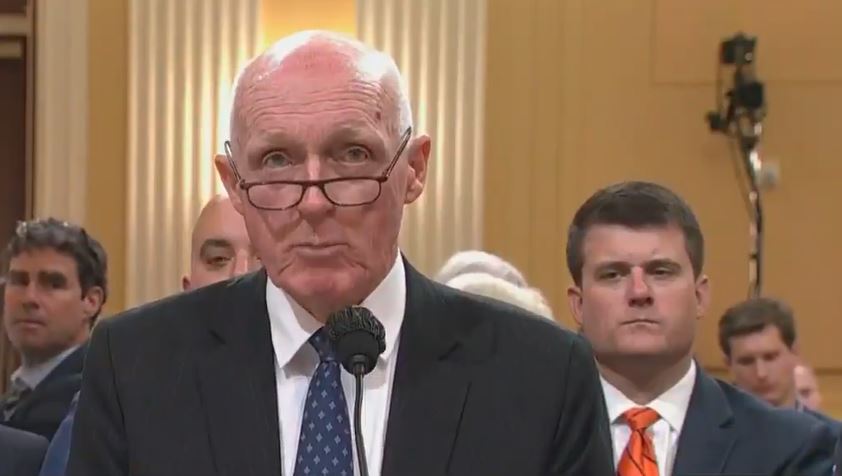
by Corinne Murdock | Jun 21, 2022 | News
By Corinne Murdock |
Less than 24 hours after the Joint Legislative Budget Committee published the proposed budget report late Monday, infighting broke out among Arizona’s House and Senate Republicans.
Tuesday marked lengthy budget discussions in the House Appropriations Committee, but in the Senate discussions were cut off abruptly with an indefinite recess of the Senate Appropriations Committee. Effectively, public budget talks ended before they started in half of the State Capitol.
State Senator David Gowan (R-Sierra Vista) said that the House didn’t honor its agreements to pass some bills; one of those significant ones being the Arizona Board of Regents (ABOR) continuation.
“The House has decided that they will not honor the deals we created together and move things forward. I know there’s some media out there, social stuff going on, that they’re trying to pin us and maybe leverage us. But the point is here, they blew the deal,” said Gowan.
Gowan added that he wasn’t willing to call the committee together later on in the day, either. It appears that House legislators reneged on some serious closed-door talks — enough to upset him.
“It would be pretty hard for me to want to come back and help people who wish not to honor deals. In that effort, it’s just not appropriate in what just occurred, so I want that out to the world,” said Gowan.
However, State Representative Travis Grantham (R-Gilbert) contended that he’d never heard of these deals as the House Rules Committee Chairman. He criticized Gowan’s preferences as “special interest” legislation that was “fat, bloated, […] unconstitutional,” and adverse to Republican interests. Gowan didn’t reply.
“I have never discussed a deal, agreed to a deal or been part of some secretive deal to move certain Senator’s special interest bills that are fat, bloated and in some instances likely unconstitutional,” wrote Grantham. “And further, why would we invite and pay an industry, with taxpayer dollars to come into our great state when they will ban, boycott and take away major meetings, corporations and events because of our Republican majorities and sound policies? #BadIdea”
Those weren’t the only serious breaks from presenting a unified Republican front on the budget. Several individual Republican legislators vocalized dissatisfaction with the budget emphatically on social media and during committee votes.
As the majority, the GOP will have to resolve those opposed within its membership if it hopes to secure the budget’s passage before the new fiscal year begins next Friday, July 1.
Among those opposed to the budget are State Senator Michelle Ugenti-Rita (R-Scottsdale). She asserted that the budget wasn’t fiscally responsible in the face of a looming recession. Ugenti-Rita scorned provisions of the bill as “pet projects” for fellow members.
That contradicted how State Representative Regina Cobb (R-Kingman) characterized the budget during the House Appropriations Committee on Tuesday. Cobb said that the proposed budget bills would afford the state with an 8 to 10 percent cushion — enough to “weather the storm” of a pending recession, asserting repeatedly that paying off the pension debt and rollovers would remove troublesome burdens in coming years.
“Are we going to flatline tomorrow or July 1? Absolutely not, but we’ve projected it to be fiscally conservative,” said Cobb. “I think if we’re going into a recession, we’re paying off a lot of debt that could be hanging over our heads during a recession.”
State Representative Jake Hoffman (R-Queen Creek) also opposed the budget. He declared that the budget would only worsen an impending sustained recession and current, serious economic destruction. Hoffman criticized the raises to state employees and judges of up to 15 percent. Although Hoffman was the only Republican committee member to vote against the bill, the legislator said that the budget doesn’t reflect the majority’s platform.
“Everything in [our constituents’] lives are going up, and they’re not getting raises right now. If they are, they’re under the inflation rate,” said Hoffman.
Arizona Free Enterprise Club, a free market policy and advocacy organization, asserted that extraneous funding for agendas contrary to the interests of Arizonans were sprinkled into the budget. In a statement to AZ Free News, President Scot Mussi declared that the budget largely fulfilled Democrats’ wishlist.
“The proposed budget deal includes hundreds of millions in new spending, subsidies for Hollywood liberals to make movies, tax hikes for a Green New Deal transit plan in Maricopa County and special interest pork to buy Democrat votes,” said Mussi. “We should be working toward a budget that has full Republican support, not a Build Back Broke budget supported by Democrats.”
By and large, Democrats focused their comments Tuesday on lamenting the budget’s K-12 spending. Some accused the budget’s design as a “shell game.” Several noted that they didn’t like the idea of funding more border security.
One of the most vocal opponents of the budget, State Representative Kelli Butler (D-Paradise Valley), called the ongoing revenue calculations “irresponsible” during committee. Butler also said that she and a majority of Arizona voters wanted $1 billion for K-12 education. Butler accused the budget of shell games related to taxation that made education funding more vulnerable.
Despite the ongoing economic turmoil and near-universal expectation of a recession, Butler asserted that the economy was “thriving.” Butler also took issue with the fact that she was still getting briefings by midnight and memos from staff at one am early Tuesday, arguing that no legislators had time to figure out what’s all in the budget.
Present at the State Capitol were educator activists with the Arizona Education Association (AEA) rallying for more teacher pay using the $5.3 billion surplus.
Those for the budget praised it for getting more things right to address the state’s current needs. One Democrat, State Representative Cesár Chávez (D-Maryvale) signaled support for the budget, pointing out during committee that the legislature had a little over a week before its deadline for the budget hits. He concurred with his Democratic peers that K-12 education needed a “true, historic investment,” but that he had a responsibility to make the budget work ahead of the deadline.
State Representative Michelle Udall (R-Mesa) offered a list of positives within the budget solving statewide problems: over $1 billion to solve water supply problems; over $1.6 billion overall increase in K12 spending, which meted out to $750 per pupil or a $23,000 increase per classroom; over $1 billion in debt payoff in unfunded liabilities and pensions; over $1 billion increase in public safety (police, fires, courts); and over $500 million to increase health care like in diabetes management training and postpartum care.
Corinne Murdock is a reporter for AZ Free News. Follow her latest on Twitter, or email tips to corinne@azfreenews.com.

by Corinne Murdock | Jun 21, 2022 | News
By Corinne Murdock |
Arizona House Speaker Rusty Bowers (R-Mesa) sat next to Georgia Secretary of State Brad Raffensperger and his chief operating officer Gabriel Sterling, wearing stoic expressions as they awaited the hearing and eliciting the occasional smile as a tight gaggle of reporters filmed and photographed the trio. Though, later on, Bowers would grow upset, even holding back tears when his responses turned to include references to the Constitution and his daughter, who passed away a year ago.
Also smiling was Representative Adam Schiff (D-CA-28), when he entered the room behind the more somber-faced Committee Chair Bennie Thompson (D-MS-02) and Vice Chair Liz Cheney (R-WY), and throughout his line of questioning.
Thompson commenced the hearing by recapping the committee’s narrative that former President Donald Trump orchestrated the January 6 riot at the Capitol to overturn the 2020 general election, despite knowing completely that he lost the election. The committee characterized Bowers and Raffensperger as two of the handful of “brave” officials who stood between Trump and the 2020 election results.
Thompson said that lack of action would further undermine future actions and lead to “catastrophe.”
Cheney echoed Thompson’s statements, directing viewers to understand calls made by Trump to state officials within the context of the committee’s claim that the former president knew that the election wasn’t stolen. Cheney told viewers that they shouldn’t be distracted by “conspiracy theories and thug violence.”
“The point is this: Donald Trump did not care about the threats of violence. He did not condemn them. He did not care to stop them,” said Cheney. “Today we’re going to see an example of what truly makes America great.”
The committee characterized nationwide discontent with the 2020 general election’s validity as “increasingly violent” in the weeks preceding January 6.
Bowers was the first to testify. As he was about to begin Schiff said he received word from his staff about one of the latest statements issued by Trump claiming that Bowers affirmed that the election was “rigged” and that the former president won Arizona.
“Bowers should hope there’s not a tape of the conversation,” said Trump.
Trump’s statement disrupted the hearing proceedings; it prompted Schiff to vet Bowers about Trump’s claims and the content of the call in question. Bowers categorically denied Trump’s account of the phone call.
In the statement, Trump called Bowers a “RINO,” short for “Republican In Name Only” and referred to the January 6 Committee as the “Unselect Committee.”
Bowers asserted that on a phone call with Trump, lawyer Rudy Giuliani promised to give him evidence of mass voter fraud, but never did. Bowers said he told Trump he refused to overturn the election results because it was against his oath as an elected official.
“I said look, you’re asking me to do something that is counter to my oath, that is sworn to the Constitution, that I uphold it,” said Bowers. “This is totally foreign as an idea or a theory to me, and I would never do anything with such deep magnitude without consultation of my attorneys.”
Bowers held back tears as he described how Trump’s pressure caused internal turmoil for him, because his faith inspired a deep respect for the Constitution as a divinely inspired document.
Bowers confirmed that he met with Giuliani at a Phoenix hotel after the election. He recounted that Giuliani repeated claims of mass voter fraud, which Arizona State Senators pressed him on. Bowers said that he and Giuliani both pressed Trump lawyer Jenna Ellis to turn over the evidence to the Arizona legislators, but she kept claiming that she didn’t have it on her.
Bowers denied ever receiving evidence of mass voter fraud from Trump’s team. He noted that he and other members of his staff remembered Giuliani admitting that they had no evidence, just theories on voter fraud in the 2020 election.
“My recollection: he said ‘We’ve got lots of theories, we just don’t got evidence,’” recounted Bowers.
The committee revealed previously undisclosed video of “Stop the Steal” protestors, which prominently featured Jacob Angeli, commonly referred to as the “QAnon Shaman,” who is currently serving his 41-month sentence for breaking into the Capitol on January 6.
Bowers alleged that Trump’s lawyer John Eastman asked him to deny the 2020 election results and “just let the courts sort it out later.” He clarified that he recalled Eastman saying, in so many words, that the authority of the legislature was plenary and that he as house speaker had the authority to undertake the requested action.
Additionally, Bowers alleged that Congressman Andy Biggs (R-AZ-05) asked him to support overturning the election results.
Schiff referred back to a previous press release from Bowers in which the speaker declared he wouldn’t decertify the election results.
“We have no legal pathway nor to my knowledge in federal law, for us to execute such a request. I am not allowed to walk or act beyond my authority. If I’m not specifically authorized as a state legislator, then I cannot act,” said Bowers.
In closing, Bowers read from his diary, citing that his Christianity moved him to oppose Trump. He also described facing angry constituents in the aftermath, some of whom came to his home while his gravely ill daughter was inside.
“It is painful to have friends who have been such a help to me turn on me with such rancor,” read Bowers. “How else will I ever approach [God] in the wilderness of life, knowing that I ask this guidance only to show myself a coward in defending the course he led me to take?”
Corinne Murdock is a reporter for AZ Free News. Follow her latest on Twitter, or email tips to corinne@azfreenews.com.

by Corinne Murdock | Jun 21, 2022 | Education, News
By Corinne Murdock |
On Thursday, a district court judge denied a mother’s motion to dismiss in a lawsuit filed against her by the creator of a dossier on parents who opposed his son’s tenure as school board president. The mother leaked the dossier, located on a Google Drive, to local reporters after noticing the URL in pictures sent to her by the school board president.
Mark Greenburg — father of the former board president of Scottsdale Unified School District (SUSD) who had access to the dossier, Jann-Michael Greenburg — sued SUSD parents Amanda and Daniel Wray for allegedly violating the Computer Fraud and Abuse Act (CFAA), a federal law on unauthorized computer access. The Wrays countered by filing an anti-SLAPP motion to dismiss, which claims that a lawsuit is filed strategically to prevent public participation. Judge Douglas Rayes, an appointee of former President Barack Obama, denied the Wrays’ motion to dismiss.
Rayes said his decision was a “close call.” He acknowledged that the elder Greenburg lacked a password protection on the Google Drive, therefore making it accessible to anyone with its link. However, Rayes agreed with the elder Greenburg’s argument that this lack of security didn’t render the Google Drive dossier open to the public, and that Wray’s inadvertent discovery of the URL didn’t give her authorization to access the dossier.
The Rayes declared that the elder Greenburg “sufficiently plead the elements of a violation” of the CFAA. He established a scheduling conference on July 7 at 11 am, with a deadline for a revised proposed discovery plan on June 30.
Wray deferred to her counsel for comment.
In a statement to AZ Free News, Harmeet Dhillon — the managing partner of Dhillon Law Group representing Wray — clarified that the judge’s decision only reflected Greenburg’s allegations and didn’t constitute Rayes’ final decision on the case.
“A motion to dismiss is typically made at the outset of most cases in federal court, and it is a test not of the facts of the case, but rather of the plaintiff’s allegations,” said Dhillon. “While we respectfully disagree with the court’s ruling and believe the law requires dismissal at this stage, we look forward to the discovery phase of the lawsuit and to establishing the actual facts in this case.”
Corinne Murdock is a reporter for AZ Free News. Follow her latest on Twitter, or email tips to corinne@azfreenews.com.

by Corinne Murdock | Jun 20, 2022 | News
By Corinne Murdock |
A superior court judge rejected Arizona Attorney General Mark Brnovich’s complaint against Secretary of State Katie Hobbs’ election manual last Friday because he filed it too close to ongoing elections.
Yavapai Superior Court Judge John Napper expressed concern that siding with Brnovich would disrupt this year’s elections.
Napper acknowledged that Hobbs’ 2021 Elections Manual and Procedures (EPM) required editing and revision. However, he declared that Brnovich’s refusal to work with Hobbs on the proposed EPM didn’t mean that Hobbs didn’t fulfill her lawful duties, noting that Brnovich had from October 1 to December 31 to work on the EPM with Hobbs, as prescribed by statute.
“The parties’ failure to properly work with one another to improve the Secretary’s initial draft of the EMP [sic] does not mean she failed to perform a ministerial or discretionary act requiring a mandate from the Court,” wrote Napper. “At this point in the game, there is no mechanism for the Court to assist the parties in constructing an EMP [sic] which complies with A.R.S. § 16-452 within the timeline of the statute. The Complaint was filed far too late for this to occur without disrupting elections that have already begun.”
That doesn’t mean that Hobbs’ latest EPM will be used in current elections. Napper noted that election officials are following the EPM from 2019 since it was submitted and approved properly by both the governor and attorney general.
Hobbs celebrated the ruling. She characterized Brnovich’s complaint as “an attempt to rewrite the election rules” for political gain. Brnovich didn’t issue a public statement on the ruling.
Hobbs’ criticism paralleled those of opponents to her 2021 EPM, who argued that she was incorporating certain changes — such as allowing certain votes to be cast at the wrong precinct — to benefit her gubernatorial campaign.
Brnovich filed his complaint against Hobbs for the 2021 EPM at the end of April.
Corinne Murdock is a reporter for AZ Free News. Follow her latest on Twitter, or email tips to corinne@azfreenews.com.
.

by Corinne Murdock | Jun 20, 2022 | News
By Corinne Murdock |
The valley’s first annual Juneteenth celebration from Black Lives Matter (BLM) Phoenix Metro, a fundraiser, ended before it started due to a low level of community interest.
“Hey BLM family! Deepest regrets but our Juneteenth event is postponed. We’ll keep you all updated on the new date. Juneteenth is a very important holiday that should be taken seriously and celebrated,” wrote the organization. “We unfortunately did not have the capacity or momentum behind this event to put it on this year. We were hoping for this to be an awesome event. Stay tuned for our next big celebration.”
Those wishing to attend were asked to pay a minimum of $50 for general admission, which came with a swag bag, limited edition BLM shirt, and one green raffle ticket which could win designer sunglasses or other luxury items with a $500 to $1,000 value.
There were other, higher-priced tickets: $100 for a “supporter”-level ticket, which came with the general admission items plus an additional green raffle ticket, and a “trailblazer”-level ticket, which came with the general admission items plus an additional red raffle ticket for winning luxury items over $1,000 in value. A limited, undisclosed number of “solidarity” tickets for low-income and BIPOC-only individuals (Black, Indigenous, People of Color) were available for $25.
The organization, which has over 10,000 followers on Twitter and over 33,400 followers on Instagram, first announced the event in early May.
BLM Phoenix Metro explains that part of its mission is dismantling white supremacy, abolishing police and prisons, and prompting community healing from generational trauma. As part of their “Who We Are” page, the organization quotes Assata Shaukur, the infamous cop killer and FBI Most Wanted Terrorist.
Some of the organization’s most recent work included protesting outside Phoenix City Hall against increased funds for the police force.
Corinne Murdock is a reporter for AZ Free News. Follow her latest on Twitter, or email tips to corinne@azfreenews.com.





